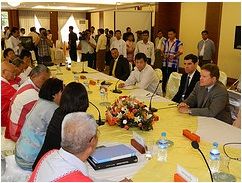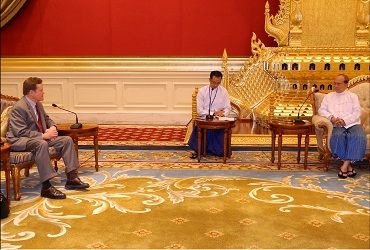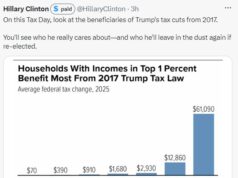 Senator Webb has called for lifting all economic sanctions against Burma. What seem slowly unfolding changes in that nation after decades of tyranny are significant achievements on two fronts. They merit the potential galvanizing effects of Webb’s proposal.
Senator Webb has called for lifting all economic sanctions against Burma. What seem slowly unfolding changes in that nation after decades of tyranny are significant achievements on two fronts. They merit the potential galvanizing effects of Webb’s proposal.
“Many people are beginning to say that the democratisation process here is irreversible. It’s not so.” – Aung San Suu Kyi
The strange new territory the relationship between the United States and Burma may enter is one that could shape the application of power into the future. It is promising. For once the United States may have imposed its will on an adversary without resorting to military intervention. Next it establishes a dynamic in the relationship where both parties pursue interests that are complementary and mutually beneficial while continued reform is its own reward. This is a balancing act. American temperament and policy usually reflect our impatience and many will challenge what may be perceived as acting too swiftly. But the window of opportunity will not remain open forever. Six months from now, when our attention is elsewhere and we have not acted, there will be no reason for Burma’s leadership to perform in crisis in any way differently than has kept them in power to date.
 Sanctions are indiscriminate. There are dozens of views as to their efficacy, but one fact remains: sanctions most affect those with the least to lose. This is illustrated by the people of rural North Korea who subsist on grass while the plump children of the ruling elite eat candy bars in posh Pyongyang hotel lobbies. In Burma the ethnic minorities have suffered greatly from the sanctions. And the ethnic minorities threaten the stability and progress of the nascent democratization. The fact is that unless the nation as a whole sees better conditions, there is little chance that this fragile condition can be sustained. Reforms should be associated with and reinforced by improved economic activity and conditions.
Sanctions are indiscriminate. There are dozens of views as to their efficacy, but one fact remains: sanctions most affect those with the least to lose. This is illustrated by the people of rural North Korea who subsist on grass while the plump children of the ruling elite eat candy bars in posh Pyongyang hotel lobbies. In Burma the ethnic minorities have suffered greatly from the sanctions. And the ethnic minorities threaten the stability and progress of the nascent democratization. The fact is that unless the nation as a whole sees better conditions, there is little chance that this fragile condition can be sustained. Reforms should be associated with and reinforced by improved economic activity and conditions.
Lifting sanctions on Burma does not equal normalizing diplomatic relations or even full trading relations. Lifting the sanctions will provide diplomatic leverage. The current full-on policy leaves nothing on the table with which to bargain. Our only remaining option for influence is the use of force. That hasn’t worked out extremely well in any part of Asia.
“…executive decisions to remove sanctions can still target and blacklist the assets or activities of specific “bad actors” from the previous military junta so that they will not benefit from economic relations with the United States. These decisions do not require legislation; importantly, they can also be reversed, should the situation in Burma deteriorate.” – Senators Webb and Inhofe
My experience in Asia and Africa establishing a baseline with military counterparts informs my perspective. In struggling nations, what you find is that even when the functionaries share common ground with you, they need to take away more than goodwill in order to move the negotiations. This is only human. Our own common law heritage requires an exchange of value for a contract to be binding. We need to bind the Burmese to progress.
Sources close to the U.S. government told me that U.S. delegations to Burma are generally impressed by the openness of the leadership of the Tatmadaw (the armed forces). “Whenever senior U.S. officials meet a Burmese military chief or defense minister and raise the issue of human rights violations committed by the army in ethnic areas, the military doesn’t deny it,” says a source. “They admit that things are not very pretty on the ground, and ask for U.S. assistance, including training for the Tatmadaw officers.” Not bad. – Min Zin in Foreign Policy Magazine
On the surface, most Americans (who, unfortunately, spend maybe five minutes a year thinking about Southeast Asia) see Aung San Suu Kyi being seated in the Parliament as nothing more than what should be expected. It is much more than that. That she was able to speak out and still succeed demonstrates a tolerance for opposition and willingness for change unprecedented. She was under house arrest in 1990 when her party, the National League for Democracy (NLD), won the election by a landslide. It was not allowed to take power. The fact that President Thein Sein’s government, elected in 2010 (an election boycotted by the NLD), allows formal opposition is a dramatic change that merits the change in relations.
Not that the policies of Europe and Japan should drive ours, but it is important to note that both have already lifted most sanctions. These are our allies and their judgment deserves consideration. But most of all, for whatever reason, President Thein Sein has chosen the path toward democracy. We should help the Burmese pave it themselves by allowing economic prosperity.


 Sign up for the Blue Virginia weekly newsletter
Sign up for the Blue Virginia weekly newsletter![Tuesday News: “Johnson gambles on plan separating Israel aid from Ukraine funds”; “It Took One Day for Trump to Get in Trouble at His First Criminal Trial”; “If [Youngkin] wanted to write bills, he should have run to serve in the General Assembly”](https://bluevirginia.us/wp-content/uploads/2024/04/trumptrial-238x178.jpg)






![Tuesday News: “Johnson gambles on plan separating Israel aid from Ukraine funds”; “It Took One Day for Trump to Get in Trouble at His First Criminal Trial”; “If [Youngkin] wanted to write bills, he should have run to serve in the General Assembly”](https://bluevirginia.us/wp-content/uploads/2024/04/trumptrial-100x75.jpg)

